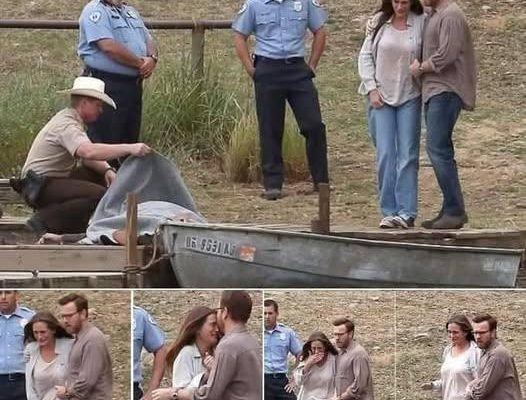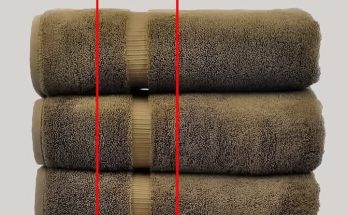Filming in the quiet town of Bartlesville, Oklahoma, Roberts transformed into Barbara Weston, a complex woman grappling with family dysfunction, resentment, and loss. The change was striking — gone were the bright smiles, designer gowns, and polished red-carpet looks. In their place stood a woman stripped of vanity, wearing loose blue trousers, a simple cream blouse layered under a white shirt, and no visible makeup. Her long brown hair fell naturally, unstyled and unremarkable, embodying the fatigue and realism of her character.
Observers on set could barely reconcile the image before them with the glamorous woman who captivated audiences in Pretty Woman and Erin Brockovich. This was Julia Roberts as few had seen her — raw, understated, and deeply immersed in her craft.
On that particular day of filming, Roberts was joined by co-star Ewan McGregor, who played her husband, Bill Fordham. The two were seen shooting one of the film’s most emotional moments — a scene at a boat dock where their characters brace themselves for a grim task: identifying a body believed to be Barbara’s missing father. Witnesses described the mood as heavy and tense, with Roberts fully embodying Barbara’s exhaustion and grief.
Her performance was marked by a kind of quiet ferocity. There were no theatrics, no vanity shots — just a woman unraveling beneath the weight of decades of pain and family secrets. It was a role that demanded emotional vulnerability over physical beauty, and Roberts didn’t hold back.
The film, based on Tracy Letts’ Pulitzer Prize–winning play, tells the story of the Weston family — a sprawling, volatile clan brought together by tragedy when their patriarch, Beverly Weston, disappears. Meryl Streep stars as Violet Weston, the domineering matriarch whose sharp tongue and addiction to painkillers poison nearly every interaction. Roberts’ Barbara, Violet’s eldest daughter, becomes both her mother’s adversary and mirror image — fiercely intelligent, emotionally raw, and fighting desperately to hold her crumbling family together.
Alongside Roberts and McGregor, the film boasted an ensemble cast that included Benedict Cumberbatch as the awkward and sensitive “Little Charles,” Juliette Lewis as the flighty youngest sister Karen, and Abigail Breslin as Barbara’s teenage daughter, Jean. Chris Cooper, Dermot Mulroney, and Julianne Nicholson rounded out the supporting cast, each delivering performances that matched the film’s intensity.
Interestingly, the film’s casting went through several changes before shooting began. British actress Andrea Riseborough was initially set to play Karen Weston but had to step away due to scheduling conflicts. The role ultimately went to Juliette Lewis, whose interpretation brought a chaotic and unpredictable energy to the family dynamic. Renée Zellweger was also reportedly considered for a part early in the process.
Abigail Breslin, best known for her breakout role in Little Miss Sunshine, secured the part of Jean Fordham, the rebellious daughter caught between generations of dysfunction. Chloë Grace Moretz had also auditioned for the role but ultimately didn’t make the final cut.
While the casting process was competitive, Roberts’ involvement gave the project immediate prestige. She had been drawn to the script’s depth — the sharp dialogue, the dark humor, and the chance to explore the kind of raw emotional terrain rarely afforded to female characters her age.
Off camera, Roberts was grounded and professional, despite the demanding schedule and emotionally heavy material. Locals in Bartlesville described her as warm and approachable, often chatting with crew members between takes or grabbing coffee in town. There was no trace of Hollywood ego, just an actor intent on doing justice to the story she’d chosen to tell.
Her husband, cinematographer Daniel Moder, and their three children occasionally visited her on set, reminding her of the balance she worked hard to maintain between her personal life and career. Roberts has often spoken about prioritizing family over fame, and her grounded presence during filming reflected that philosophy.
The role of Barbara Weston marked a turning point for Roberts — a chance to shed the image of the “America’s Sweetheart” archetype and embrace the complexity of middle age. The film demanded that she confront vulnerability head-on, portraying a woman whose strength masks deep emotional fractures. Critics later praised her performance for its restraint and authenticity.
When August: Osage County premiered in 2013, audiences were reminded of Roberts’ depth as an actor. Her on-screen chemistry with Meryl Streep was electric — two powerhouse performers locked in a brutal dance of love and resentment. The mother-daughter confrontations were some of the film’s most memorable moments, marked by biting dialogue and raw emotion. One scene, in which Barbara and Violet explode into a shouting match over years of unresolved tension, became a masterclass in controlled chaos.
Behind the scenes, Roberts admitted that some of those moments were emotionally draining to film. “There were days when I went home and just sat in silence,” she later told an interviewer. “The story takes a lot out of you. But that’s also why it’s worth doing.”
Her willingness to strip away the protective layers of stardom resonated with audiences who had followed her career since Pretty Woman. This wasn’t Julia Roberts the romantic lead or the charismatic lawyer — it was Julia Roberts, the artist, willing to be uncomfortable and even unrecognizable to tell a story that mattered.
The film itself received critical acclaim, earning multiple award nominations, including two Academy Award nods — one for Streep and another for Roberts as Best Supporting Actress. It cemented her reputation not just as a movie star but as an actor capable of profound transformation.
Now, years later, August: Osage County remains one of the standout performances in Roberts’ career — a testament to her courage to evolve in an industry obsessed with youth and perfection. Her portrayal of Barbara Weston peeled back the Hollywood polish to reveal something more enduring: truth.
Julia Roberts may have looked “unrecognizable” during filming, but perhaps that was the point. Beneath the makeup-free face and simple wardrobe was a woman who had nothing left to prove — an actor who had built her legacy not on beauty or fame, but on the fearless pursuit of authenticity.
And for those who remember the glamorous smile that once defined a generation, seeing her stripped of artifice only made one thing clearer: Julia Roberts never needed the spotlight to shine. Her brilliance was never in the surface — it was, and always has been, in the soul she brings to every story she tells.



